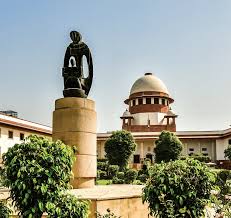This appeal is at the instance of two unsuccessful original writ petitioners before the High Court. The appellant No. 1 herein in his capacity as the elected member of the Senate of Kannur University and the appellant No. 2 herein in his capacity as the member of the Academic Council of the said University together questioned the legality and validity of reappointment of the respondent No. 4 herein, namely, Dr. Gopinath Ravindran as the Vice-Chancellor of the Kannur University by filing Writ Petition (C) No. 26975 of 2021 in the High Court of Kerala, primarily on the ground that the respondent No. 4 was not eligible for reappointment as the Vice-Chancellor of the Kannur University. (Para 2)
It appears that in the meantime, the Minister for Higher Education and Social Justice in her capacity as the Pro-Chancellor addressed a letter to the Governor/Chancellor dated 22.11.2021 recommending reappointment of the respondent No. 4 herein for a second term as the Vice-Chancellor of the University. (Para 5)
The challenge to the notification referred to above, reappointing the respondent No. 4 as the Vice-Chancellor for a further term of four years was essentially on two grounds. First, in view of Section 10(9) of the Act 1996, no person who is more than sixty years of age can be appointed as Vice-Chancellor. In other words, the outer age limit for being appointed as the Vice-Chancellor of the University being sixty years, the respondent No. 4 could not have been reappointed as the Vice-Chancellor having crossed the age of sixty years. Secondly, even for the purpose of reappointment, the entire procedure necessary for being appointed as the Vice-Chancellor for the first time should have been undertaken. In other words, the procedure prescribed in Section 10 of the Act 1996 ought to have been followed even at the time of reappointment. (Para 9)
If a statute expressly confers a statutory power on a particular body or authority or imposes a statutory duty on the same, then such power must be exercised or duty performed (as the case may) by that very body or authority itself and none other. (Para 71)
The truth is that the same was initiated by the Chief Minister and Higher Education Minister.” The last part of the report is also relevant. It states that the process of selection of Vice-Chancellor which was set in motion vide Notification dated 27.10.2021 came to an end consequent to the request from the Minister of Higher Education and the opinion of the Advocate General, State of Kerala. (Para 80)
The aforestated facts make it abundantly clear that there was no independent application of mind or satisfaction or judgment on the part of the Chancellor and the respondent No. 4 came to be reappointed only at the behest of the State Government. (Para 81)
Under the scheme of the Act 1996 and the statutes, the Chancellor plays a very important role. He is not merely a titular head. In the selection of the Vice- Chancellor, he is the sole judge and his opinion is final in all respects. In reappointing the Vice-Chancellor, the main consideration to prevail upon the Chancellor is the interest of the university. (Para 82)
The Chancellor was required to discharge his statutory duties in accordance with law and guided by the dictates of his own judgment and not at the behest of anybody else. Law does not recognise any such extra constitutional interference in the exercise of statutory discretion. Any such interference amounts to dictation from political superior and has been condemned by courts on more than one occasions.
It is now well settled that a writ of quo warranto lies if any appointment to a public office is made in breach of the statute or the rules. In the case on hand, we are not concerned with the suitability of the respondent No. 4. The “suitability” of a candidate for appointment to a post is to be judged by the appointing authority and not by the court unless the appointment is contrary to the statutory rules/provisions. We have reached to the conclusion that although the notification reappointing the respondent No. 4 to the post of Vice-Chancellor was issued by the Chancellor yet the decision stood vitiated by the influence of extraneous considerations or to put it in other words by the unwarranted intervention of the State Government. (Para 84)
It is the Chancellor who has been conferred with the competence under the Act 1996 to appoint or reappoint a Vice-Chancellor. No other person even the Pro-Chancellor or any superior authority can interfere with the functioning of the statutory authority and if any decision is taken by a statutory authority at the behest or on a suggestion of a person who has no statutory role to play, the same would be patently illegal. (Para 85)
Thus, it is the decision-making process, which vitiated the entire process of reappointment of the respondent No. 4 as the Vice-Chancellor. The case on hand is not one of mere irregularity. (Para 86)
The impugned judgment and order passed by the High Court dated 23.02.2022 is hereby set aside. As a consequence, the Notification dated 23.11.2021, reappointing the respondent No. 4 as the Vice-Chancellor of the Kannur University is hereby quashed. (Para 90)
SUPREME COURT OF INDIA
2023 STPL(Web) 457 SC
[2023 INSC 1032]
Dr. Premachandran Keezhoth & Anr. Vs. Chancellor Kannur University & Ors.
Civil Appeal No. 7700 of 2023-Decided on 30-11-2023
https://stpllaw.in/wp-content/uploads/2023/12/2023-STPLWeb-457-SC.pdf







